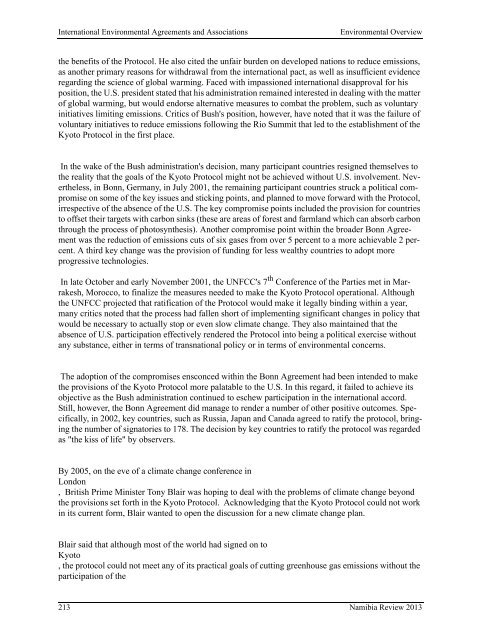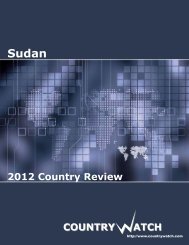Namibia - CountryWatch
Namibia - CountryWatch
Namibia - CountryWatch
Create successful ePaper yourself
Turn your PDF publications into a flip-book with our unique Google optimized e-Paper software.
International Environmental Agreements and Associations Environmental Overview<br />
the benefits of the Protocol. He also cited the unfair burden on developed nations to reduce emissions,<br />
as another primary reasons for withdrawal from the international pact, as well as insufficient evidence<br />
regarding the science of global warming. Faced with impassioned international disapproval for his<br />
position, the U.S. president stated that his administration remained interested in dealing with the matter<br />
of global warming, but would endorse alternative measures to combat the problem, such as voluntary<br />
initiatives limiting emissions. Critics of Bush's position, however, have noted that it was the failure of<br />
voluntary initiatives to reduce emissions following the Rio Summit that led to the establishment of the<br />
Kyoto Protocol in the first place.<br />
In the wake of the Bush administration's decision, many participant countries resigned themselves to<br />
the reality that the goals of the Kyoto Protocol might not be achieved without U.S. involvement. Nevertheless,<br />
in Bonn, Germany, in July 2001, the remaining participant countries struck a political compromise<br />
on some of the key issues and sticking points, and planned to move forward with the Protocol,<br />
irrespective of the absence of the U.S. The key compromise points included the provision for countries<br />
to offset their targets with carbon sinks (these are areas of forest and farmland which can absorb carbon<br />
through the process of photosynthesis). Another compromise point within the broader Bonn Agreement<br />
was the reduction of emissions cuts of six gases from over 5 percent to a more achievable 2 percent.<br />
A third key change was the provision of funding for less wealthy countries to adopt more<br />
progressive technologies.<br />
In late October and early November 2001, the UNFCC's 7 th Conference of the Parties met in Marrakesh,<br />
Morocco, to finalize the measures needed to make the Kyoto Protocol operational. Although<br />
the UNFCC projected that ratification of the Protocol would make it legally binding within a year,<br />
many critics noted that the process had fallen short of implementing significant changes in policy that<br />
would be necessary to actually stop or even slow climate change. They also maintained that the<br />
absence of U.S. participation effectively rendered the Protocol into being a political exercise without<br />
any substance, either in terms of transnational policy or in terms of environmental concerns.<br />
The adoption of the compromises ensconced within the Bonn Agreement had been intended to make<br />
the provisions of the Kyoto Protocol more palatable to the U.S. In this regard, it failed to achieve its<br />
objective as the Bush administration continued to eschew participation in the international accord.<br />
Still, however, the Bonn Agreement did manage to render a number of other positive outcomes. Specifically,<br />
in 2002, key countries, such as Russia, Japan and Canada agreed to ratify the protocol, bringing<br />
the number of signatories to 178. The decision by key countries to ratify the protocol was regarded<br />
as "the kiss of life" by observers.<br />
By 2005, on the eve of a climate change conference in<br />
London<br />
, British Prime Minister Tony Blair was hoping to deal with the problems of climate change beyond<br />
the provisions set forth in the Kyoto Protocol. Acknowledging that the Kyoto Protocol could not work<br />
in its current form, Blair wanted to open the discussion for a new climate change plan.<br />
Blair said that although most of the world had signed on to<br />
Kyoto<br />
, the protocol could not meet any of its practical goals of cutting greenhouse gas emissions without the<br />
participation of the<br />
213 <strong>Namibia</strong> Review 2013




